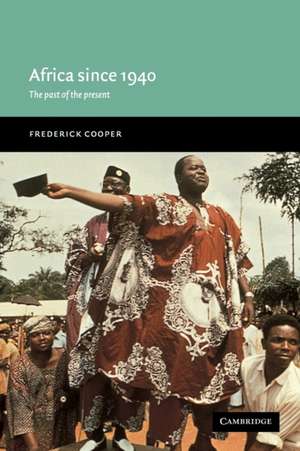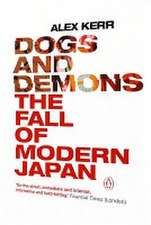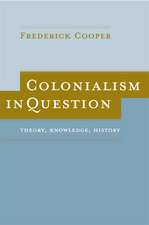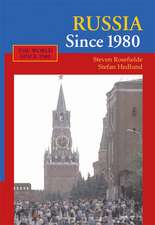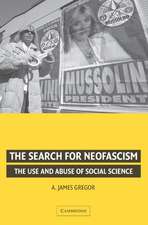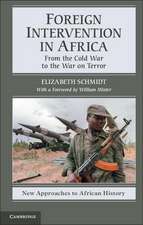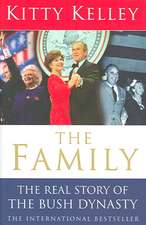Africa since 1940: The Past of the Present: New Approaches to African History, cartea 1
Autor Frederick Cooperen Limba Engleză Paperback – 9 oct 2002
| Toate formatele și edițiile | Preț | Express |
|---|---|---|
| Paperback (2) | 193.86 lei 3-5 săpt. | +20.06 lei 7-13 zile |
| Cambridge University Press – 3 iul 2019 | 193.86 lei 3-5 săpt. | +20.06 lei 7-13 zile |
| Cambridge University Press – 9 oct 2002 | 259.11 lei 38-44 zile | |
| Hardback (2) | 575.64 lei 6-8 săpt. | |
| Cambridge University Press – 3 iul 2019 | 575.64 lei 6-8 săpt. | |
| Cambridge University Press – 9 oct 2002 | 579.39 lei 38-44 zile |
Preț: 259.11 lei
Nou
Puncte Express: 389
Preț estimativ în valută:
49.58€ • 51.77$ • 41.03£
49.58€ • 51.77$ • 41.03£
Carte tipărită la comandă
Livrare economică 01-07 aprilie
Preluare comenzi: 021 569.72.76
Specificații
ISBN-13: 9780521776004
ISBN-10: 0521776007
Pagini: 230
Ilustrații: 35 b/w illus. 5 maps 2 tables
Dimensiuni: 152 x 228 x 17 mm
Greutate: 0.32 kg
Ediția:New.
Editura: Cambridge University Press
Colecția Cambridge University Press
Seria New Approaches to African History
Locul publicării:New York, United States
ISBN-10: 0521776007
Pagini: 230
Ilustrații: 35 b/w illus. 5 maps 2 tables
Dimensiuni: 152 x 228 x 17 mm
Greutate: 0.32 kg
Ediția:New.
Editura: Cambridge University Press
Colecția Cambridge University Press
Seria New Approaches to African History
Locul publicării:New York, United States
Cuprins
Recenzii
'Cooper's new edition, with its profound and stimulating exploration of Africa's post-2000 spurts of growth, documents links to the preceding eras of post-colonial development and neoliberal disinvestment. He portrays African citizens, though enmeshed in a network of world affairs, as finding new ways to cope with the continent's possibilities and restraints.' Patrick Manning, University of Pittsburgh
'Not once, but now twice, Cooper has performed that rare trick of producing a genuinely introductory text for the beginner that also excites seasoned scholars with its interpretive depth and flair. Not content with simply tacking on an 'update' chapter in this second edition, he has also refreshed 'old' chapters and their bibliographies. Maps, figures, and pictures are superb.' John Lonsdale, University of Cambridge
'Cooper's survey is the most thorough, artful, and compelling text available on Africa's late-colonial and post-colonial history. Africa since 1940 combines a masterful historical narrative with an acute and insightful examination of the continent's troubled politics. This new and significantly updated edition is the place to start for any reader wishing to understand the dynamics of Africa's recent past.' David M. Anderson, University of Warwick
'Frederick Cooper's brilliant Africa since 1940 was by far the most popular book in Cambridge's New Approaches to African History series. Now, he presents a revised, much expanded, and original second edition, which not only updates to the present the story he tells, but expands his analysis. This is once again the most perceptive critique of Africa's recent history.' Martin Klein, University of Toronto
'When Africa since 1940 was first published, it was a major event: here was a comprehensive introduction to twentieth-century African history that actually proffered new and important arguments linking the colonial and independence eras. It is the only introductory text I've considered using. Thoroughly updated, including a survey of post-2000 developments - covering epoch-shaping events such as the 'Africa rising' narrative, militant Islam, democracy and reform in states like Ethiopia, and much more - Africa since 1940 remains an essential read for teachers, students, and anyone interested in Africa's past and present.' Daniel Magaziner, Yale University, Connecticut
'Africa has often appeared as a monolithic entity, both in popular imaginations, and in academic and policy discourses - a place marked by a history of colonialism, poverty, and violence. In this measured and rigorously researched text on the continent's history from the 1940s to the present, Frederick Cooper argues powerfully against the tendency to read Africa reductively, thereby occluding a rich history of possibilities. All students of the continent - beginners and specialists alike - will profit immensely from this work.' Andreas Eckert, Humboldt-Universität zu Berlin
'Once more, Frederick Cooper helps us rediscover how the urban and rural people of Africa struggled to understand and refashion their way to independence, in spite of tremendous difficulties. A clear and lucid book for all readers.' Catherine Coquery-Vidrovitch, Université Paris Diderot
'Since its publication in 2002, Africa since 1940 has been the most indispensable book in the field of African history. It is a useful textbook for students, and I've enjoyed teaching from it for years. But, more importantly, it set out a coherent, capacious analytic with which to see Africa's past. In this revised and updated edition, there are new themes - religion and gender, among others - that allow a more capacious view. There is an expanded and enriched geographic scope. And there is a whole new chapter about twenty-first-century Africa, allowing Cooper to describe the fate of the 'gatekeeper state' up to recent times. Now more than ever, Cooper's clear-headed, unromantic, synthetic, far-seeing book is essential. It furnishes all of us students of Africa's past with a shared vocabulary to think about history and the future.' Derek R. Peterson, University of Michigan
'Cooper has an extraordinary ability to synthesize the vast and discordant evidence of change in Africa since 1940. Since 1940, Africa has witnessed periods of enthusiastic expectations for development, and periods of wrenching disappointments. Since 1960, Africa's population has tripled, propelling youth into the forefront of change even as aging leaders refuse to yield power. Since the 1990s, parts of Africa have experienced high economic growth fueled by demand for raw materials. As Cooper notes, such growth may be part of long-established short-term spurts and does not necessarily translate as development. Cooper reminds us that there are many Africas and many trajectories of change. The new edition has been updated to reflect on these and other changes and it remains the standard for understanding modern African history.' Richard Roberts, Stanford University, California
'This educational book, which discusses important concepts while presenting the major axes of the recent history of continent, is an excellent introduction to the history contemporary of Africa.' Claire Nicolas
'Not once, but now twice, Cooper has performed that rare trick of producing a genuinely introductory text for the beginner that also excites seasoned scholars with its interpretive depth and flair. Not content with simply tacking on an 'update' chapter in this second edition, he has also refreshed 'old' chapters and their bibliographies. Maps, figures, and pictures are superb.' John Lonsdale, University of Cambridge
'Cooper's survey is the most thorough, artful, and compelling text available on Africa's late-colonial and post-colonial history. Africa since 1940 combines a masterful historical narrative with an acute and insightful examination of the continent's troubled politics. This new and significantly updated edition is the place to start for any reader wishing to understand the dynamics of Africa's recent past.' David M. Anderson, University of Warwick
'Frederick Cooper's brilliant Africa since 1940 was by far the most popular book in Cambridge's New Approaches to African History series. Now, he presents a revised, much expanded, and original second edition, which not only updates to the present the story he tells, but expands his analysis. This is once again the most perceptive critique of Africa's recent history.' Martin Klein, University of Toronto
'When Africa since 1940 was first published, it was a major event: here was a comprehensive introduction to twentieth-century African history that actually proffered new and important arguments linking the colonial and independence eras. It is the only introductory text I've considered using. Thoroughly updated, including a survey of post-2000 developments - covering epoch-shaping events such as the 'Africa rising' narrative, militant Islam, democracy and reform in states like Ethiopia, and much more - Africa since 1940 remains an essential read for teachers, students, and anyone interested in Africa's past and present.' Daniel Magaziner, Yale University, Connecticut
'Africa has often appeared as a monolithic entity, both in popular imaginations, and in academic and policy discourses - a place marked by a history of colonialism, poverty, and violence. In this measured and rigorously researched text on the continent's history from the 1940s to the present, Frederick Cooper argues powerfully against the tendency to read Africa reductively, thereby occluding a rich history of possibilities. All students of the continent - beginners and specialists alike - will profit immensely from this work.' Andreas Eckert, Humboldt-Universität zu Berlin
'Once more, Frederick Cooper helps us rediscover how the urban and rural people of Africa struggled to understand and refashion their way to independence, in spite of tremendous difficulties. A clear and lucid book for all readers.' Catherine Coquery-Vidrovitch, Université Paris Diderot
'Since its publication in 2002, Africa since 1940 has been the most indispensable book in the field of African history. It is a useful textbook for students, and I've enjoyed teaching from it for years. But, more importantly, it set out a coherent, capacious analytic with which to see Africa's past. In this revised and updated edition, there are new themes - religion and gender, among others - that allow a more capacious view. There is an expanded and enriched geographic scope. And there is a whole new chapter about twenty-first-century Africa, allowing Cooper to describe the fate of the 'gatekeeper state' up to recent times. Now more than ever, Cooper's clear-headed, unromantic, synthetic, far-seeing book is essential. It furnishes all of us students of Africa's past with a shared vocabulary to think about history and the future.' Derek R. Peterson, University of Michigan
'Cooper has an extraordinary ability to synthesize the vast and discordant evidence of change in Africa since 1940. Since 1940, Africa has witnessed periods of enthusiastic expectations for development, and periods of wrenching disappointments. Since 1960, Africa's population has tripled, propelling youth into the forefront of change even as aging leaders refuse to yield power. Since the 1990s, parts of Africa have experienced high economic growth fueled by demand for raw materials. As Cooper notes, such growth may be part of long-established short-term spurts and does not necessarily translate as development. Cooper reminds us that there are many Africas and many trajectories of change. The new edition has been updated to reflect on these and other changes and it remains the standard for understanding modern African history.' Richard Roberts, Stanford University, California
'This educational book, which discusses important concepts while presenting the major axes of the recent history of continent, is an excellent introduction to the history contemporary of Africa.' Claire Nicolas
